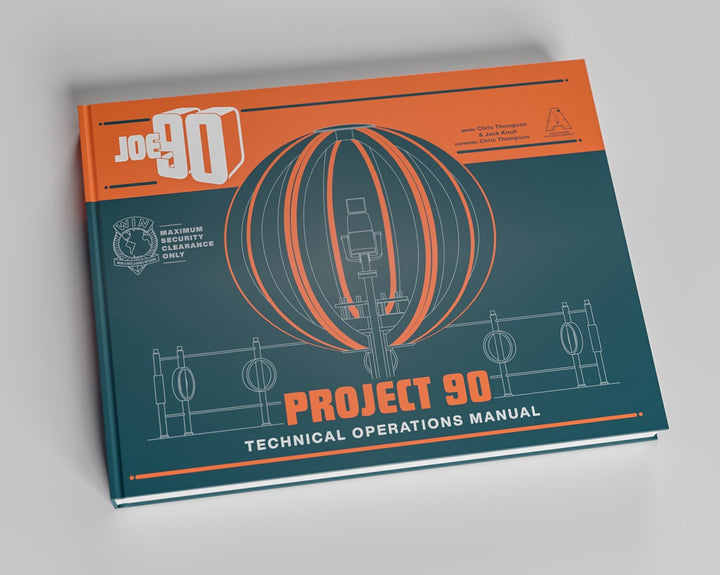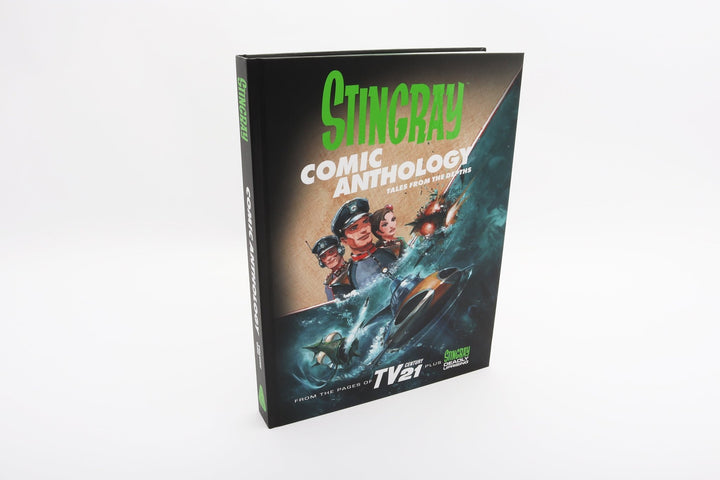Exclusive Interview: Ed Straker Speaks!

Dateline: September 15th, 1980
Ed Straker is the head of one of the UK’s biggest independent studios, Harlington-Straker Studios. Whereas most movie makers are only too willing to talk about their work, Straker has gained the reputation of being reticent, almost to the point of reclusiveness. Having been granted a rare interview with the man himself, Steve Hardy attempts to discover what the lack of fuss is all about…
 More exclusive content and candid photographs from this interview can be found in the October 1980 Issue of Cineplay Monthly magazine
‘Hands off!’
Ed Straker tilts his chair back and blows a thick ring of cigar smoke up towards the ceiling of his plush office in the admin block of Harlington-Straker Studios. He’s explaining his personal philosophy of film-making. ‘I keep my hands off. I don’t interfere. I’m not the creative kind, I’m a business man. I provide the money and the others provide the magic.’
Edward Straker must qualify as the world’s most unlikely film producer. Formerly a career airman - a USAF colonel with a degree in astrophysics and two years at MIT to his credit - he quit the military life a decade ago to set up the independent Harlington-Straker Studios in Harlington West. So why the rather startling change in career direction?
‘I was in a car crash some years back. I wasn’t too badly hurt but the medics told me I could never been classed 100 percent fit again, so I was invalided out. I guess the crash made me reconsider things’
But why motion pictures?
‘It’s not as different from the military as you might imagine. It’s all down to organisation and life in the military is all about being organised. The subject is different but the approach is pretty much the same.’
Rural England is long way from Hollywood both literally and figuratively. Straker and his ‘dream factory’ seem oddly out of place in the depths of sleepy Wessex. Why set up shop so far from where the action is? What’s the attraction? Straker leans across the desk and his tone takes on an almost conspiratorial air.
‘You know, that IS the attraction. Harlington West is a great place to have a studio. Sure, there are a few studios in and around London but there’s nothing quite like our set-up. This is a custom-built facility, from the ground-up. We’re kind of exclusive and we don’t really feel we have to compete.’ Having made his point, Straker leans back in his seat and takes another puff on his cigar.
Harlington-Straker Studios seem a little out-of-step with current production trends. Increasingly studios are used as production facilities for independent producers. HHS still produces its own films maintaining its own roster of technicians, producers and directors. It’s also just about the last major motion picture studio in the world to keep a company of actors on exclusive contracts. A few independent productions do rent space and facilities at HSS but overall there’s an indefinable sense of the whole operation being something of a ‘closed shop’.
‘Sometimes the old way is the best. We may seem a little old-fashioned but the way we do things here is a little different to the way other studios do anyway. We don’t do things by the book. There’s very much a sense of community here. Once people come to work for us they tend to stay… they WANT to stay. Having a dedicated team is also good for innovation. For instance, we’ve recently developed a unique pulse-lighting system for special effects work which we’re in the process of patenting. The competition would love to get their hands on something like that. Believe me, our technicians are the best in the world!’
Isn’t there a risk that they could be lured away with the promise of Hollywood’s big money?
‘No, not really. Like I said, people who work for us are in it for the long haul. They’re dedicated to the job itself, not how much it pays. We keep it interesting for them.’
Despite Straker’s assurances that HSS are innovators their films are only moderate box-office. Reviews also tend to be rather moribund and some cases, scathing. The ‘Frank Admissions’ sex-comedies of the early seventies were heavily criticised even at the time.
‘Frank Admissions!’’ Straker’s façade cracks into a genuine and very un-corporate grin. ‘Frank was quite a character, wasn’t he? You know those films were very important to us in the early years of our operation. They were our bread and butter. I guess they look more than a little dated nowadays but the public loved them at the time! For a while Ken Matthews was a household name. It’s such a shame he died so young. He was a very talented actor with a bright future.’
The biggest HSS successes to date are the cult SF offerings, ‘Flesh Hunters’ and ‘Sporting Blood.’ Their success came as something of a surprise. Mention of the two hits causes a momentary flash of what could only be described as mild irritation to permeate the usually inscrutable features.
‘The success of ‘Flesh Hunters’ and ‘Sporting Blood’ did come as a surprise. They didn’t have bigger budgets, nor were they promoted differently to any of our other films. There just seemed to be a kind of word-of-mouth thing that happened with them. They were very, very popular with the mid-teen market. Sell-through figures for video-cassettes been very impressive.’
The momentary irritation passes and a slight twinkle enters Straker’s steel-blue eyes as he adds an afterthought. ‘Of course I’m pleased. I just wish I knew why they were such a success so I could duplicate it for every movie we make!’
More exclusive content and candid photographs from this interview can be found in the October 1980 Issue of Cineplay Monthly magazine
‘Hands off!’
Ed Straker tilts his chair back and blows a thick ring of cigar smoke up towards the ceiling of his plush office in the admin block of Harlington-Straker Studios. He’s explaining his personal philosophy of film-making. ‘I keep my hands off. I don’t interfere. I’m not the creative kind, I’m a business man. I provide the money and the others provide the magic.’
Edward Straker must qualify as the world’s most unlikely film producer. Formerly a career airman - a USAF colonel with a degree in astrophysics and two years at MIT to his credit - he quit the military life a decade ago to set up the independent Harlington-Straker Studios in Harlington West. So why the rather startling change in career direction?
‘I was in a car crash some years back. I wasn’t too badly hurt but the medics told me I could never been classed 100 percent fit again, so I was invalided out. I guess the crash made me reconsider things’
But why motion pictures?
‘It’s not as different from the military as you might imagine. It’s all down to organisation and life in the military is all about being organised. The subject is different but the approach is pretty much the same.’
Rural England is long way from Hollywood both literally and figuratively. Straker and his ‘dream factory’ seem oddly out of place in the depths of sleepy Wessex. Why set up shop so far from where the action is? What’s the attraction? Straker leans across the desk and his tone takes on an almost conspiratorial air.
‘You know, that IS the attraction. Harlington West is a great place to have a studio. Sure, there are a few studios in and around London but there’s nothing quite like our set-up. This is a custom-built facility, from the ground-up. We’re kind of exclusive and we don’t really feel we have to compete.’ Having made his point, Straker leans back in his seat and takes another puff on his cigar.
Harlington-Straker Studios seem a little out-of-step with current production trends. Increasingly studios are used as production facilities for independent producers. HHS still produces its own films maintaining its own roster of technicians, producers and directors. It’s also just about the last major motion picture studio in the world to keep a company of actors on exclusive contracts. A few independent productions do rent space and facilities at HSS but overall there’s an indefinable sense of the whole operation being something of a ‘closed shop’.
‘Sometimes the old way is the best. We may seem a little old-fashioned but the way we do things here is a little different to the way other studios do anyway. We don’t do things by the book. There’s very much a sense of community here. Once people come to work for us they tend to stay… they WANT to stay. Having a dedicated team is also good for innovation. For instance, we’ve recently developed a unique pulse-lighting system for special effects work which we’re in the process of patenting. The competition would love to get their hands on something like that. Believe me, our technicians are the best in the world!’
Isn’t there a risk that they could be lured away with the promise of Hollywood’s big money?
‘No, not really. Like I said, people who work for us are in it for the long haul. They’re dedicated to the job itself, not how much it pays. We keep it interesting for them.’
Despite Straker’s assurances that HSS are innovators their films are only moderate box-office. Reviews also tend to be rather moribund and some cases, scathing. The ‘Frank Admissions’ sex-comedies of the early seventies were heavily criticised even at the time.
‘Frank Admissions!’’ Straker’s façade cracks into a genuine and very un-corporate grin. ‘Frank was quite a character, wasn’t he? You know those films were very important to us in the early years of our operation. They were our bread and butter. I guess they look more than a little dated nowadays but the public loved them at the time! For a while Ken Matthews was a household name. It’s such a shame he died so young. He was a very talented actor with a bright future.’
The biggest HSS successes to date are the cult SF offerings, ‘Flesh Hunters’ and ‘Sporting Blood.’ Their success came as something of a surprise. Mention of the two hits causes a momentary flash of what could only be described as mild irritation to permeate the usually inscrutable features.
‘The success of ‘Flesh Hunters’ and ‘Sporting Blood’ did come as a surprise. They didn’t have bigger budgets, nor were they promoted differently to any of our other films. There just seemed to be a kind of word-of-mouth thing that happened with them. They were very, very popular with the mid-teen market. Sell-through figures for video-cassettes been very impressive.’
The momentary irritation passes and a slight twinkle enters Straker’s steel-blue eyes as he adds an afterthought. ‘Of course I’m pleased. I just wish I knew why they were such a success so I could duplicate it for every movie we make!’
 'Harlington Straker Studios' impressive and lofty goals are illustrated in the studio's lavishly produced prospectus.
Low-budget Sci-Fi movies seems to make up quite a sizeable chunk of HSS’s output. Is there any particular reason for favouring that genre?
Straker seems back in more certain territory and the wall-to-wall corporate spiel makes a return. ‘There’s a market for it. Simple as that. We’ve garnered a good reputation for producing very watchable Sci-Fi movies that seem to find favour with the public, so we keep on making them. We maintain a steady business through those kinds of movies and the shareholders seem happy enough’
What’s the appeal? Are you a fan of the genre yourself?
Straker smiles and shakes his head. ‘I have the greatest respect for the people who can dream-up that kind of thing but myself, I’m a little too stuffy and ordered to be able to “get it”. I think it’s my military background. It’s all very colourful and exciting but a little too far-fetched for my tastes.’
Despite their incredibly modest budgets the films all look very good.
‘Like I said, we’ve got the best technicians in the world on our payroll. We have the know-how. We may be independent but this is no Mickey Mouse operation. We take what we do seriously.’
The television side of the HSS has developed a good deal in recent years at what many see as being at the expense of the movies industry.
‘TV and motion pictures can operate in parallel. Television is evolving differently to film so the two don’t necessarily compete. It’s true that realism is increasingly becoming a part of television drama but there is still a market for escapism and variety. We meet that demand.’
There was something in the trade press a while back that you’re entering in a partnership with noted TV producer Gerry Anderson.
‘That’s right. Gerry is a visionary and he and I think along very similar lines. He’s signed a contract with us to produce a two new TV series and a couple of features. I don’t want to give too much of the game away at this stage but we’re looking at developing Caspar Lancaster’s John Nexus series of spy novels into an ongoing movie franchise. Gerry’s also going to be working on a series as a vehicle for singer and dancer Peter Carlin. Peter’s very keen to expand into acting so we’re developing an action adventure series with him as the star.’
What else can we expect from Harlington-Straker Studios in the coming year?
‘There’s always something going on around here but even I can’t tell you everything.’ The thinnest of smiles finds its way onto the big man’s lips. ‘We all have our secrets, don’t we?’
'Harlington Straker Studios' impressive and lofty goals are illustrated in the studio's lavishly produced prospectus.
Low-budget Sci-Fi movies seems to make up quite a sizeable chunk of HSS’s output. Is there any particular reason for favouring that genre?
Straker seems back in more certain territory and the wall-to-wall corporate spiel makes a return. ‘There’s a market for it. Simple as that. We’ve garnered a good reputation for producing very watchable Sci-Fi movies that seem to find favour with the public, so we keep on making them. We maintain a steady business through those kinds of movies and the shareholders seem happy enough’
What’s the appeal? Are you a fan of the genre yourself?
Straker smiles and shakes his head. ‘I have the greatest respect for the people who can dream-up that kind of thing but myself, I’m a little too stuffy and ordered to be able to “get it”. I think it’s my military background. It’s all very colourful and exciting but a little too far-fetched for my tastes.’
Despite their incredibly modest budgets the films all look very good.
‘Like I said, we’ve got the best technicians in the world on our payroll. We have the know-how. We may be independent but this is no Mickey Mouse operation. We take what we do seriously.’
The television side of the HSS has developed a good deal in recent years at what many see as being at the expense of the movies industry.
‘TV and motion pictures can operate in parallel. Television is evolving differently to film so the two don’t necessarily compete. It’s true that realism is increasingly becoming a part of television drama but there is still a market for escapism and variety. We meet that demand.’
There was something in the trade press a while back that you’re entering in a partnership with noted TV producer Gerry Anderson.
‘That’s right. Gerry is a visionary and he and I think along very similar lines. He’s signed a contract with us to produce a two new TV series and a couple of features. I don’t want to give too much of the game away at this stage but we’re looking at developing Caspar Lancaster’s John Nexus series of spy novels into an ongoing movie franchise. Gerry’s also going to be working on a series as a vehicle for singer and dancer Peter Carlin. Peter’s very keen to expand into acting so we’re developing an action adventure series with him as the star.’
What else can we expect from Harlington-Straker Studios in the coming year?
‘There’s always something going on around here but even I can’t tell you everything.’ The thinnest of smiles finds its way onto the big man’s lips. ‘We all have our secrets, don’t we?’
 More exclusive content and candid photographs from this interview can be found in the October 1980 Issue of Cineplay Monthly magazine
More exclusive content and candid photographs from this interview can be found in the October 1980 Issue of Cineplay Monthly magazine 'Harlington Straker Studios' impressive and lofty goals are illustrated in the studio's lavishly produced prospectus.
'Harlington Straker Studios' impressive and lofty goals are illustrated in the studio's lavishly produced prospectus.
We'd like to extend our thanks to Steve Hardy for his fascinating interview with Mr Straker and to Andrew Mark Thompson for his inspired artwork!




![Thunderbirds Comic Anthology Volume One [HARDCOVER] - The Gerry Anderson Store](http://gerryanderson.com/cdn/shop/files/thunderbirds-comic-anthology-volume-one-hardcover-8030771.jpg?v=1751089031&width=720)
![All Sections Alpha: The Making of Space: 1999 [HARDCOVER] - The Gerry Anderson Store](http://gerryanderson.com/cdn/shop/files/all-sections-alpha-the-making-of-space-1999-hardcover-7498116.png?v=1757766647&width=720)

![Stingray Comic Anthology Volume Two – Battle Lines [HARDCOVER] - The Gerry Anderson Store](http://gerryanderson.com/cdn/shop/files/stingray-comic-anthology-volume-two-battle-lines-hardcover-107681.jpg?v=1738856151&width=720)
![Stingray W.A.S.P. Technical Operations Manual Standard Edition [HARDCOVER] - The Gerry Anderson Store](http://gerryanderson.com/cdn/shop/files/stingray-wasp-technical-operations-manual-standard-edition-hardcover-112278.jpg?v=1749664163&width=720)
![Stingray WASP Technical Operations Manual Special Limited Edition [HARDCOVER BOOK] - The Gerry Anderson Store](http://gerryanderson.com/cdn/shop/files/stingray-wasp-technical-operations-manual-special-limited-edition-hardcover-book-991914.jpg?v=1749657538&width=720)
![Stingray: The Titanican Stratagem – Signed Limited Edition [HARDCOVER NOVEL] - The Gerry Anderson Store](http://gerryanderson.com/cdn/shop/files/stingray-the-titanican-stratagem-signed-limited-edition-hardcover-novel-129251.jpg?v=1740558711&width=720)









